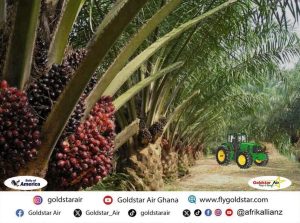| Getting your Trinity Audio player ready... |
Unique private international airline Goldstar Air, Ghanaian and United States–registered company with an issued Air Carrier Licence (ACL/N-SCH No. 0239) from the Ghana Civil Aviation Authority (GCAA) to operate passenger and cargo flights across West Africa and intercontinental routes, with no liabilities as of today and has secured incentives from some major airports worldwide. The airline’s 24-hour service is pioneering an innovative approach to elevate Ghana’s tourism industry by introducing agrotourism into the sector through its aviation network, cargo capabilities, and strategic partnerships. This initiative aims to transform Ghana into a premier agrotourism destination, attracting global travelers, boosting rural economies, and promoting sustainable agricultural practices.
Ghana’s agricultural sector is a cornerstone of its economy, contributing significantly to employment, food security, and foreign exchange earnings. However, the sector’s potential remains largely untapped, particularly in the area of agrotourism, a niche that combines agriculture with tourism to create immersive, educational, and economically viable experiences. Goldstar Air’s 24-hour service aims to showcase Ghana’s agricultural wealth while creating new revenue streams for farmers and local communities as part of the airline’s socioeconomic transformation agenda under its Project $1 Trillion Foreign Reserves Visionary Blueprint.
Goldstar Air has sought for international intervention to look into the issuance of the airline’s wide-body aircraft Safety Certificate (AOC) and waiting for the outcome, as the process is above halfway and it has been over eight years that the Ghana Civil Aviation Authority is not ready to get a qualified third-party to complete the remaining phases of the certification process. The completion of the certificate will enable the change of the wide-body aircraft nationality, allowing it to be registered under the Ghana Registry (State of Registry).
The airline’s extensive route network will connect international tourists to Ghana’s farming hubs, while its cargo operations will facilitate the export of premium organic produce, further enhancing the country’s global agricultural reputation. Therefore, there is no need to delay the issuance of the airline’s Safety Certificate, to start the 24-hour economy and create over two million direct and indirect job opportunities for Ghanaians. The Ghanaian youth cannot wait any longer in the ghettos, they need well-paying jobs now.
The World Bank says Ghana/s rapidly growing youth population has the potential to significantly boost the country’s economy, but only if sufficient job opportunities are created. The Bank recommends that, a key focus should be on youth and their transition from school to work, ensuring they have the skills needed for a modern economy to provide strong employment opportunities, essential for realizing the demographic dividend.
Goldstar Air, the wings of Ghana and the belly of America, will introduce specialized agrotourism flight packages that include discounted airfares, farm stays, and curated culinary tours. Travelers booking flights from Europe or North America can opt for a “Taste of Ghana” package, which combines air travel with visits to organic farms, cooking classes with local chefs, and markets where they can purchase fresh produce. These packages will be marketed through Goldstar’s global partnerships with travel agencies and promoted via in-flight magazines and digital platforms, targeting eco-conscious travelers and food enthusiasts.
The other critical component of the initiative is the airline’s cargo division, which will transport agrotourism-related goods such as organic spices, cocoa products, and traditional beverages to international markets. By branding these products as “Grown in Ghana, Shared with the World,” Goldstar Air will enhance their appeal and create a direct link between tourism and export growth. The airline’s in-flight menu will exclusively feature Ghanaian dishes prepared with ingredients sourced from partner farms, further reinforcing the agrotourism narrative.
Goldstar Air will also collaborate with the Ghana Tourism Authority and the Ministry of Food and Agriculture to establish agrotourism certification standards. These standards will ensure that participating farms meet criteria for sustainability, visitor safety, and cultural authenticity. Certified farms will receive marketing support, including listings on Goldstar’s travel portal and inclusion in international agrotourism directories.
The farm tourism accreditation systems, training programs for rural tourism operators, and sustainable environmental practices will ensure minimal ecological impact. Goldstar Air is also initiating partnerships with universities and research centers to promote agritourism research, monitoring, and innovation. By aligning with agricultural modernization and tourism diversification agendas, the airline reinforces national development goals and provides a model for public–private collaboration.

Educational outreach forms another pillar of this initiative. Goldstar Air will sponsor student exchange programs that bring international agriculture students to Ghana for hands-on learning. Partnerships with universities will facilitate research on sustainable farming techniques, with findings shared across the agrotourism network to improve productivity and environmental stewardship.
Goldstar Air’s agrotourism strategy is rooted in the seamless integration of aviation and agriculture, creating a symbiotic relationship that benefits farmers, tourists, and the national economy. The airline’s first major step involves the development of agrotourism hubs in key farming regions such as the Volta, Eastern, Ashanti, Western, and Northern territories. These hubs will serve as central points where tourists can participate in farm-to-table experiences, including cocoa harvesting in the Brong Ahafo, Ashanti, Eastern, Volta, and Western Regions, pineapple picking in the Eastern Region, and shea butter production in the Upper West. Each hub will feature guided tours, interactive workshops, and tastings, allowing visitors to engage directly with Ghana’s agricultural processes.
Agrotourism presents a unique opportunity to diversify Ghana’s tourism offerings beyond its rich cultural heritage and wildlife. By integrating farm visits, agri-educational tours, and culinary experiences into travel itineraries, Goldstar Air is pioneering a concept that intertwines aviation with immersive agrotourism experiences, positioning Ghana to tap into the global tourism income stream valued at $10.9 Trillion.
According to the Chairman and Chief Executive Officer of Goldstar Air, Eric Bannerman, the airline’s role in promoting agrotourism in Ghana will illustrate how aviation can serve as a force multiplier, a system builder weaving together transport, agriculture, technology, commerce, and community into a cohesive engine of growth. Goldstar Air’s vision challenges Ghanaian farmers to elevate agriculture from subsistence to sustained competitiveness and to position the country not as a peripheral participant, but as a production pioneer. As the airline begins promoting agrotourism through its logistical, developmental, and infrastructural reach, it will take a decisive step toward a future where farms and flights together propel national development.
Goldstar Air’s agrotourism vision represents a bold step toward sustainable development, leveraging Ghana’s agricultural assets to create a unique tourism niche. By bridging aviation and agriculture, the airline is set to unlock new economic opportunities while celebrating Ghana’s farming traditions. This initiative could serve as a blueprint for other African nations seeking to diversify their tourism economies and empower rural communities. With Goldstar Air at the helm, Ghana’s agrotourism future is poised for takeoff.
The airline’s 24-hour agrotourism initiative aligns with global trends favoring experiential and sustainable tourism, positioning Ghana as a leader in Africa’s agrotourism landscape. Through strategic collaborations with farmers, tourism boards, and hospitality providers, Goldstar Air aims to redefine travel to Ghana, offering visitors the chance to engage with the nation’s agrarian roots while supporting rural development and environmental conservation.
Goldstar Air will invest in eco-lodges and farm-stay accommodations to address infrastructure gaps in rural areas, providing comfortable yet authentic experiences for tourists. These lodges will be constructed using sustainable materials and powered by renewable energy, aligning with global ecotourism trends. Additionally, the airline will train local youth as agrotourism guides and hospitality staff, creating jobs and reducing urban migration.
The airline’s marketing strategy will highlight Ghana’s agrotourism offerings through documentaries, social media campaigns, and partnerships with influencers. By showcasing success stories, such as a former galamsey miner turned organic farmer hosting tourists, Goldstar Air will underscore the transformative power of agrotourism.
Goldstar Air’s 24-hour services, visionary leadership, and commitment to socio-economic empowerment, aims to leverage Ghana’s rich agricultural heritage, diverse ecosystems, and rural communities to develop agrotourism into a robust sector. As global travelers increasingly seek authentic, experiential travel that fosters connection with nature, culture, and food systems, the airline is tapping into this rising trend to not only to promote Ghana as a destination, but also to invigorate its agricultural economy, empower rural populations, and tap into the global agricultural industry’s $4.59 Trillion income stream.
The airline’s agrotourism initiative is not only creating a new tourism product but also redefining rural development. Rural areas in Ghana often suffer from limited infrastructure, youth unemployment, and economic marginalization. By positioning agrotourism as a vehicle for economic inclusion, Goldstar Air will offer farmers and local communities new revenue streams and platforms for showcasing their way of life. Homestays, craft markets, traditional cooking classes, and cultural performances integrated into the tourism packages will provide locals with avenues to monetize their knowledge, culture, and natural resources. The airline will partner with local agribusinesses, cooperatives, educational institutions, and traditional authorities to curate immersive travel packages that highlight these agricultural marvels. Tourists will experience farm stays, guided tours of plantations, food-tasting events, agro-processing exhibitions, and interactive sessions on sustainable farming practices.

Education and cultural exchange are among the core benefits that lie in agribusiness. Goldstar Air envisions school tours, university field trips, and international student exchange programs where participants can learn about Ghanaian agriculture, environmental conservation, and rural development. These programs will be tailored to educate the next generation about food systems, climate-smart agriculture, biodiversity, and nutrition. Urban dwellers, especially youth, will be reconnected with their agrarian roots, fostering appreciation and possibly inspiring careers in agriculture. For international visitors, agrotourism will offer a unique entry point into African farming methods, heritage crops, and indigenous food systems that are increasingly relevant in the global sustainability discourse.
Furthermore, the economic multiplier effect of agrotourism is expected to be significant. Increased visitor traffic to rural areas will stimulate demand for local goods and services, encourage infrastructure development, and enhance rural-urban linkages. Small and Medium-sized Enterprises will emerge in sectors such as transportation, hospitality, crafts, agro-processing, and consultancy. Local entrepreneurs, especially women and youth, will find opportunities in tour guiding, event organization, catering, and storytelling. Goldstar Air’s commitment to skills development means that these opportunities will be matched with training and capacity-building programs, ensuring quality service delivery and sustainability.
Goldstar Air plans to launch an annual Agrarian Tourism Festival to further enhance the appeal and sustainability of agrotourism. This event will rotate across the ten agro-ecological zones of Ghana, celebrating regional agricultural identities, traditional knowledge systems, and culinary diversity. The festival will attract tourists, researchers, investors, and development partners. It will serve as a marketplace for agricultural products, innovations, and experiences, while also creating a platform for policy dialogue and industry networking. Through such high-impact events, Goldstar Air aims to mainstream agrotourism in Ghana’s national tourism calendar and attract global attention.
Tourism promotion campaigns by Goldstar Air will emphasize the authenticity, safety, and diversity of the agrotourism experience. By working closely with the Ghana Tourism Authority and international travel platforms, the airline will develop high-quality promotional materials and documentaries. Media personalities, travel writers, and bloggers will be invited to experience and publicize agrotourism. Testimonials, visual storytelling, and immersive content will drive curiosity and bookings. Through social media campaigns and international tourism expos, Goldstar Air will position Ghana’s agrotourism as a must-experience phenomenon.
Goldstar Air, the wings of Ghana and belly of America in addition to logistical support, will invest in digital infrastructure to market and manage the agrotourism experience. A dedicated platform within the airline’s booking system will allow tourists to explore available packages, book tours, interact with host communities, and provide feedback. This digital ecosystem will also showcase stories from rural Ghana, farmer profiles, traditional farming methods, and the journey of crops from soil to table, thus personalizing the travel experience and amplifying the voices of rural communities.
Mr. Bannerman emphasized that Goldstar Air will also promote Ghanaian cuisine and traditional drinks on board all flights as part of the airline’s efforts to foster agrotourism 30,000 feet above sea level. The in-flight menu will feature authentic indigenous African drinks, including Chapman, Asaana, Sobolo, Pito, Burkina, Lamugin, and Palm wine (a sweet alcoholic beverage fermented from palm tree sap, traditionally served in a local calabash). Additionally, passengers will enjoy Ghana’s signature Golden Tree chocolate drinks and bars, reinforcing the airline’s brand identity.
The menu will also include a variety of popular Ghanaian delicacies such as Plantain chips, Koose, Roasted plantain, Tapioca, Ekuegbemi, Tiger nut pudding, Oblayoo, Massa, Kuli-kuli, Akpiti, Adonlee, Kelewele, Acheke, Waakye, Fufu, Kenkey, Banku, Red-red, Abolo, Yakayaka, Aboboi, and Tatale. This initiative will provide significant opportunities for Ghanaian food and beverage companies, as Goldstar Air showcases local delicacies to a global audience.
Agrotourism is being promoted by Goldstar Air, the Wings of Ghana and Belly of America, as a way to generate additional income for Ghanaian farmers. This type of tourism will involve visiting agro-facilities such as the Komenda Sugar factory, Ekumfi Fruit Juice factory, GIHOC Distilleries, Blue Skies, Fish cultivation farms, Bakery factories, Rubber plantations, Shea butter factories, Cocoa processing factories, Sobolo canning facilities, Poultry farms, Ostrich farms, the Tetteh Quarshie Cocoa Farm, Greenhouse farms, Chocolate museums, and Livestock farms. The airline will collaborate with farm and agro-facilities owners by executing these strategies with precision, commitment, and inclusivity.

A general admission fee will be incorporated into some tour packages for events and activities, or to tour special areas of a farm. Extra income sources in agrotourism for farmers include tour fees, sales of fresh farm products to an expanded customer base, sales of processed farm products, craft/souvenir sales, class/skill-building fees, tasting fees, facility rentals, show fees, food services, and farm lodging. Tourists and farm owners will also have the opportunity to negotiate potential joint venture (JV) investments or arrange the purchase of produce for delivery to final destinations.
A tour fee provides visitors with the services of a knowledgeable guide or at least a guide for self-directed tours. Tourists paying this fee desire information about and access to farm areas restricted to other visitors. Like admission fees, tour fees are usually scaled to different audiences and group sizes. Self-guided tours are generally free; however, group tours often involve significant staff time to prepare and host. Fees may vary depending on the group. School groups may be charged per child or a flat fee per class. Group tours for adults or families will also be priced according to group size.
One of the main reasons for having visitors come to a farm is to sell them fresh farm products at retail prices. Most farms offer good value to customers, who pay less than retail to pick fresh fruits or vegetables, usually priced by volume or weight. With growing national interest in local food sources, there is ample opportunity to invite visitors to buy directly at the farm.
Many farms can expand into the sale of value-added items. Processed products made from farm produce, such as jellies, pickled goods, dried fruit, and sauces are attractive to visitors since they can be transported with less concern about spoilage and make good souvenirs or gifts. Sales of these products are enhanced when visitors see or learn how they are made and get to taste a sample. In addition to farm product sales, farm owners can capitalize on selling souvenirs such as t-shirts, ornaments, crafts, and rural antiques.
Educational tourism opportunities are on the rise, as tourists prefer to stay active and mentally engaged even while on vacation. Tourists will also take advantage of classes hosted on a farm. There are many types of classes a farm might offer: a horse farm will offer riding clinics, a grain farm will hold bread-baking classes, a fruit farm will teach jam or jelly making, a grape farm will host wine making classes for beginners, a small dairy farm will teach cheese making, an herb grower will offer classes on making herb containers or drying culinary herbs, and a vegetable farmer will conduct “cooking from the garden” sessions. The purpose of hosting a class is to charge a fee for the experience and expertise, ideally tying the activity back to the farm to encourage additional sales.
Farms that grow a wide variety of edible products might also consider offering fee-based tasting experiences, such as sampling historical apple varieties. Since these varieties are uncommon, visitors will often be willing to pay for the opportunity. In the apple example, farmers will host weekend tastings at various points during the year. Other farm products suitable for tastings include cheese, herbs, edible flowers, melons, heirloom tomatoes, berries, and other farm processed goods. If sampling products, the tasting area will be clean, wiped down regularly, and that knives and other utensils are washed in hot water.
Another way a farm can earn money from visitors is by renting out the farm setting. Empty barns can be used for dances, classes, country weddings, family reunions, birthday parties, church activities, meetings, picnic shelters, banquets, and other special events. Rental rates will depend on location and services provided. Cleanliness will be one of the most important aspects of renting barns and farm grounds for non-farm uses. Visitors will enjoy a barn atmosphere, minus dust, odors, farm noises, mud, and other distractions. Buildings will be structurally sound and equipped with restrooms suitable for large crowds.
Farm lodging may be offered in a tent, cabin, farmhouse, or any structure inspected and approved for overnight occupancy. Regardless of the type of lodging, bathroom facilities with showers will be available. Some agrotourism destinations will operate full-service restaurants. Culinary tourism is a popular attraction for food enthusiasts. Cooking demonstrations and classes, coupled with a farm tour, dinner, and farm lodging, will provide a high-value experience for such tourists.
Ghanaian farms can also earn income from visitors by charging a show fee. Common in equine competitions, show fees reimburse a farm for the expenses of conducting a show or competition and provide a small profit. The show fee amount will vary depending on the sophistication of the show, the cost of equipment and materials provided by the farm, and prevailing rates at similar venues. Craft vendors, food concessions, and other related farm-sector vendors and groups add variety and interest to a farm festival. By inviting outside groups, the farm reduces its own setup workload. It is also common to charge a booth fee to vendors, providing another revenue source.

Goldstar Air will assist farmers in developing their logos and a unified marketing theme that captures their standards and what they have to offer. The airline will ensure that the logos and imagery used in marketing materials accurately reflect the reality of what is available at the farm. Marketing materials will include colorful, eye-catching rack cards to be placed in tourism offices, other tourism outlets, and airports. These cards will feature the farm’s logo, key information what visitor will experience, photos that convey the attractions, a map, directions, opening hours, and contact details including a link to the farm’s website.
Today’s world, a farm seeking to attract visitors cannot do without a website and a Facebook page. Younger tourists, in particular, rely heavily on the internet to find activities. A farm’s website will be linked on the airline’s website and other relevant platforms where visitors search for local attractions. Social media platforms such as Facebook will also help create buzz by sharing images and stories about the farms, as well as through visitors who share their experiences with friends.
Signage is another important investment. A sign displaying the farm’s name, hours, and days of operation will serve as a communication tool for all passersby. A permanent, year-round sign with opening days will provide a constant reminder to visit. In addition to signage at the farm, placing signs on main roads leading to the property will also help guide visitors.
The agrotourism destination facilities will be equipped to host visitors of all abilities, including those in wheelchairs, using walking assistance, or pushing strollers, as well as visitors with limited English proficiency or sensory impairments. Each visitor is a living and breathing marketing opportunity for the agrotourism operation, so it is important to show respect and empathy for their perspective, no matter how naïve their question may seem. Restating their question before responding and then providing a brief, clear answer ensures understanding. Every question is a chance to educate consumers about agriculture and help them learn about current farming practices, what it takes to grow crops, raise livestock, and operate a viable farm.
Goldstar Air’s vision for agrotourism is not limited to rural leisure; it encompasses a broader socio-economic renaissance. Through this initiative, the airline aims to rebrand agriculture as a source of pride, prosperity, and innovation. It challenges the perception of rural areas as zones of poverty and backwardness, instead portraying them as vibrant centers of culture, resilience, and opportunity. In doing so, Goldstar Air will contribute to changing mindsets, especially among youth and fostering rural-urban synergy. It will also position Ghana as a global thought leader in inclusive, sustainable tourism.
Ghana must shift towards value addition to tap into global market revenues, such as Manufacturing ($16.182 Trillion), Agriculture ($4.59 Trillion), Cargo ($2.2 Trillion), and Food Services ($2.52 Trillion). Targeting just 1.8571 percent of these sectors would be enough to produce billionaires in Ghana, who in turn could reinvest in the local economy to create more employment opportunities for the youth.
Goldstar Air’s promotion of agrotourism is a bold, visionary, and inclusive initiative. It exemplifies the airline’s commitment to national development, rural empowerment, and global competitiveness. By blending aviation with agriculture, tradition with innovation, and leisure with learning, Goldstar Air is creating a transformative tourism model that benefits all stakeholders. As the initiative grows, it will catalyze rural prosperity, foster global appreciation for Ghanaian culture and agriculture, and position Goldstar Air not just as a carrier of people but as a catalyst for change. The skies above Ghana will carry not only passengers but also the hopes of farmers, the stories of rural communities, and the promise of a new kind of tourism, one that is as enriching as it is sustainable.
Ho, the capital of the Volta Region, will leverage a 24-hour industrial zone to become a key economic generator for the region. Hajj flights to and from the Kingdom of Saudi Arabia, along with charter flights, will unlock new opportunities and enhance regional connectivity.
Wa, the capital of the Upper West Region, will see its Agrarian City benefiting from charter flights that will support tourism, local business expansion, new opportunities for agribusiness, and the attraction of new companies to the area. Hajj flights to and from the Kingdom of Saudi Arabia will further open economic doors for the region.
Tamale, the capital of the Northern Region, will serve as a pivotal hub for Goldstar Air’s global maintenance hub, cargo village, specialized catering services, and training school. Plans are underway to operate international flights to and from the Sahel region, in addition to Hajj flights to and from the Kingdom of Saudi Arabia.
Kumasi, the capital of the Ashanti Region, will initially experience flights to Rome, Madrid, Hamburg, London, Düsseldorf, Milan, and Hajj flights to and from the Kingdom of Saudi Arabia.
Accra, the capital city of Ghana, will operate flights to destinations such as Washington, Dubai, Lagos, Toronto, Monrovia, Conakry, Abidjan, Guangzhou, Dakar, Banjul, Rhode Island, London, and Freetown. Additional cities under consideration include Miami (Florida), Atlanta (Georgia), Chicago (Illinois), Glasgow (Scotland), Houston (Texas), and many more.
#Flygoldstar
#WingsOfGhana
#BellyOfAmerica
#OverTwoMillionJobOpportunities




